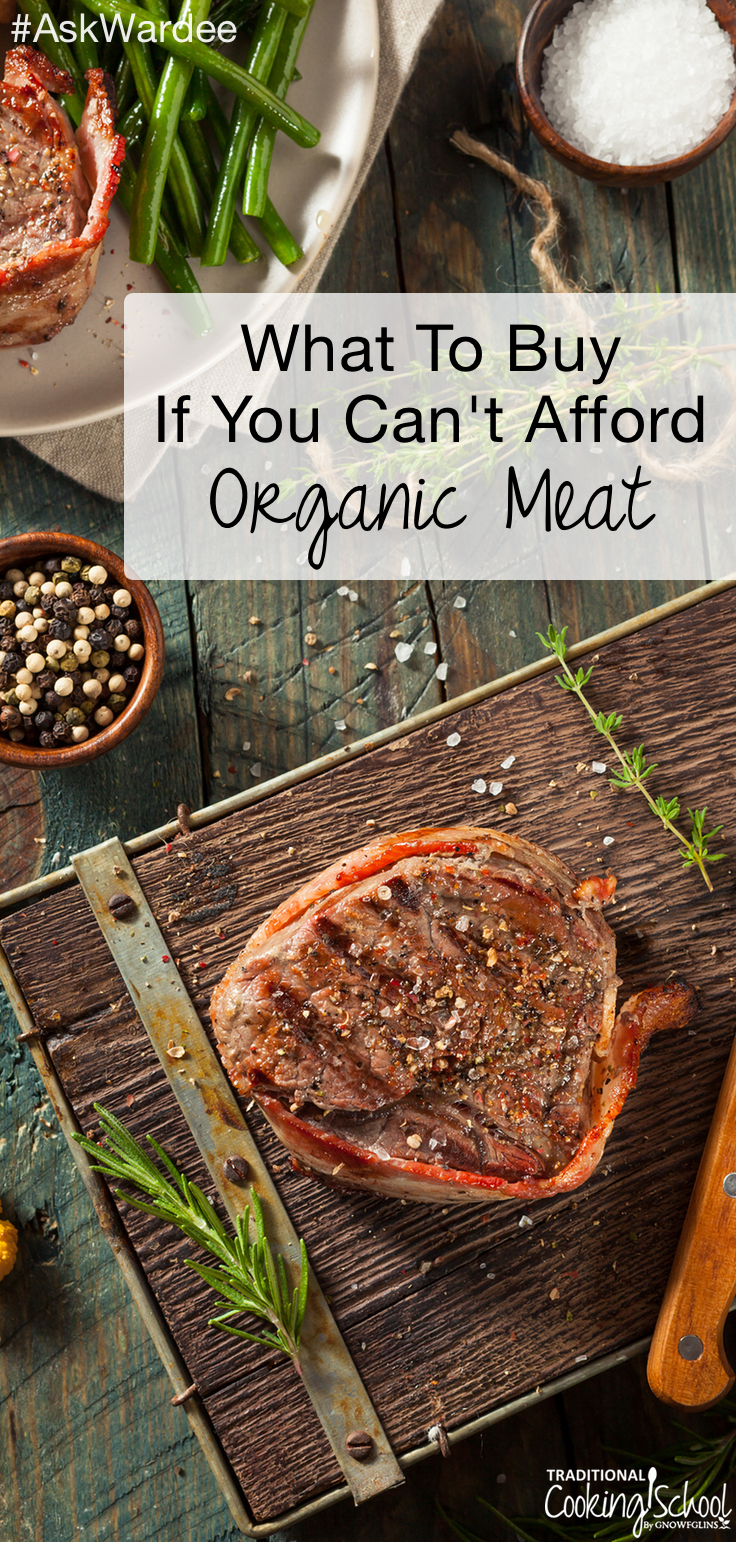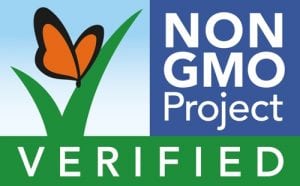
“Is it better to eat far less meat, but eat high quality meat, or is it better to eat more meat that is conventionally raised?” asks Heather.
Heather’s family is large, and they’re struggling financially. She wants to eat the best quality meat, yet her budget doesn’t go that far.
What should she do??? Are there any OK compromises or should they just eat less?
That’s what I’m tackling on this week’s #AskWardee.
I broadcast #AskWardee live each Wednesday at 10am Pacific (1pm Eastern) on Periscope and Facebook Live. Both the podcast and video replay of this week’s show are below. Enjoy!
Subscribe to #AskWardee on iTunes, Stitcher, YouTube, or the Podcasts app.
The Question: Is It Better To Eat Less Meat Or Conventional Meat?
Heather asks:
I listened to your podcast about eating meat and would love to be able to afford to eat this way. However, I have a very large family, and we are struggling financially. So, my question is this: Is it better to eat far less meat, but eat high quality meat, or is it better to eat more meat that is conventionally raised?
My Answer: What Meat To Buy
In #AskWardee 011 Do You Need Meat To Be Healthy?, I shared 6 reasons I think high quality meat is important and essential:
- Animal foods are the best sources of iron.
- The best healing foods are animal broths and soft tissues.
- Without animal foods, you may eat too many carbs to get your protein needs met.
- To be healthy, we need enough quality protein.
- Animal fats (pastured animals) provide essential fats for health.
- Animals fats provide essential fat-soluble vitamins A, D, E, and K (and one comment from a reader mentioned that Vitamin B12 can only be food in animal foods — a great point!).
See Do You Need Meat To Be Healthy? for more in-depth discussion of each reason. All of these reasons assume high-quality meat sources (grass-fed, pastured, organic, etc.).
So, yes, I think quality meat, dairy, and/or eggs are essential for good health.
Now, here’s where Heather’s question comes in…
What if you can’t afford grass-fed meat or organic meat? Do you eat less? Or do you supplement with more conventional meats?
First, Consider Your Priorities
This is for all of us, not just Heather.
My friend Tiffany (teacher of Grocery Budget Bootcamp) shares this tip:
Remember what your priorities are, because that’s where your money should go. Some families prefer high-quality meat, some prefer raw dairy, and others prefer local produce. Decide what’s important first and your money will follow suit!
First and foremost, for “the money to follow suit” we have to do the hard work of disciplining ourselves not to overspend in other areas of life — so there is actually money that can bridge the gap!
I shared more ways to stretch your food budget, such as these 10 tips to help you afford real food on a small budget. One or more of these tips can help us find extra money in our budgets for the high-priority items, like quality meats.
Also, make sure to see if any of these 14 Ways To Nourish A Large Family On A Small Budget could help you!
By The Way…
Want more money-saving grocery tips from my friend Tiffany?
Sign up for her FREE Grocery Savings Made Simple Video Series to discover simple ways you can save money on real food groceries (yes, real food!!!). It even includes a free printable workbook. I know you’ll get a lot out of it!
Click here to sign up FREE (limited time).
Second, Remember This…
I’ve said this before, and I will probably say it again!
Remember: conventional food may be cheaper in the short-term, but it’s not as cheap as we think! Consider the host of problems it has the potential to cause in the future.
Poor health, doctor bills, lack of productivity, low quality of life… some of those things cost money, some of them cost happiness. No doubt, they all cost.
Therefore, we shouldn’t feel guilty about prioritizing Real Food. Food is right up there with having a roof over your head and water to drink. Our convenience-food society has cheapened the value of food to the point that we often we feel guilty for spending money on it.
I mention this because we all need to make sure we’re not cutting corners in the budget now… only to pay the price later.
Now, Heather, let’s discuss your options. Do some or all of these options to make this work for your family.
Option #1 — Consume Your Meats With Broth.
Broth is considered a “protein sparer” — in addition to being soothing to the digestive system and oh-so-healing (more on it’s benefits in #2 of this post). This means, it helps your body assimilate and use more protein from the protein you’re already eating.
Ultimately, if you do need to serve less of a high-quality meat, serve it with broth so you and your family members will get the maximum nutrition from the meat you’re eating.
Here are 8 ways to eat broth (without drinking it straight).
Option #2 — Eat More Of The Quality Protein That’s Affordable In Your Area.
Are eggs or yogurt or beef or chicken less expensive where you live? Then fill your diet with those — your food dollars will go further and provide more protein and healthy fat for your family.
And it goes without saying — snatch up the cheap bones and organ meats your local pastured farmer or butcher offers! Few people buy them so the prices are low.
Option #3 — At The Very Least, Avoid Genetically Modified.
One of the worst characteristics of conventional meats is that the animals most likely ate genetically modified corn or soy. It’s oh-so-rampant.
GMOs are not healthy and can in fact be poisonous. Dr. Jeffrey Smith explains here:
The American Academy of Environmental Medicine (AAEM) urges doctors to prescribe non-GMO diets for all patients. They cite animal studies showing organ damage, gastrointestinal and immune system disorders, accelerated aging, and infertility. Human studies show how genetically modified (GM) food can leave material behind inside us, possibly causing long-term problems. Genes inserted into GM soy, for example, can transfer into the DNA of bacteria living inside us, and that the toxic insecticide produced by GM corn was found in the blood of pregnant women and their unborn fetuses.
Numerous health problems increased after GMOs were introduced in 1996. The percentage of Americans with three or more chronic illnesses jumped from 7% to 13% in just 9 years; food allergies skyrocketed, and disorders such as autism, reproductive disorders, digestive problems, and others are on the rise. Although there is not sufficient research to confirm that GMOs are a contributing factor, doctors groups such as the AAEM tell us not to wait before we start protecting ourselves, and especially our children who are most at risk.
The American Public Health Association and American Nurses Association are among many medical groups that condemn the use of GM bovine growth hormone, because the milk from treated cows has more of the hormone IGF-1 (insulin-like growth factor 1)?which is linked to cancer.”
Unfortunately, GMO takes conventional animal husbandry to a whole new level of unhealthy. I think GMO is worse than conventional — and conventional is pretty bad.
How can you avoid GMOs? Look for the NON GMO Project Verified label. Amazingly, it’s popping up all over the place! You can also buy organic or natural certified. Both of these certifications require that no GMO feed be used.
Option #4 — Make A Healthy Compromise With Certified Naturally Grown.
Healthy and compromise seem like a contradiction, right?
Here’s what I mean. I learned this from Tiffany Crumbs, creator of Grocery Budget Bootcamp. In every food group, there is usually a worst, better, and best option.
In this instance, the worst option is conventional meats (feedlot, GMO feed, antibiotics, pesticides, etc.), while grass-fed and/or organic (without being grain-finished) is obviously the best option.
Yet, what about the middle?
There’s a new certification — Certified Naturally Grown. This term is new to me, probably because there aren’t any such farms where I’ve lived as an adult (Oregon and Indiana).
According to Tiffany Crumbs, creator of Grocery Budget Bootcamp, Certified Naturally Grown means:
This is a certification for small-scale, direct market farmers using natural farming methods. Although they do not have a United States Department of Agriculture (USDA) certification, their practices are very similar to organic; they do not use artificial chemicals or genetically modified organism (GMO) seeds.
Wow! I had no idea this existed until I went through Tiffany’s course, Grocery Budget Bootcamp.
(Get a sneak peek by signing up for her FREE Grocery Savings Made Simple Video Series!)
Then I looked at the CNG website and saw that they have better standards for living conditions and more access to pasture than organic. Additionally, they allow for more good quality feed options: non-GMO, no synthetic fertilizers, herbicides, or pesticides. The feed doesn’t have to be organic certified, however.
Anyway, with this certification we get:
- strengthened standards for living conditions and access to pasture, AND
- good quality feed (non-GMO and no synthetic fertilizers, herbicides, or pesticides) that’s not necessarily organic certified — which keeps the costs down and options more open for farmers who are trying to do the right thing.
For these reasons, I think Certified Naturally Grown is a great compromise. If it’s available in your area, it’s likely to be cheaper than organic!
All things considered, organic meat is becoming more and more affordable. Even though it’s not necessarily local or raised on pasture, organic chicken and/or eggs is non-GMO and another doable compromise, in my opinion. As a matter of fact, if you watch sales at health food stores or frequent warehouse stores like Costco, you may find it’s quite affordable! Actually, even Kroger stores price their organic chicken the same as Costco! (I was pleasantly shocked to see this!)
Bottom Line: What To Buy If you Can’t Afford Organic Meat
You asked, so here is my answer. When it comes down to what to buy if you can’t afford organic meat, I would prefer you don’t eat conventionally raised meats. We have evidence that the organ meats are toxic. Plus, conventionally-raised animals often eat genetically modified feed, and GMOs are linked to long-term health problems.
If you can’t buy all organic and/or grass-fed, I would rather see you meet your family’s protein needs within your budget by:
- Consuming lots of broth to up the protein assimilation of the protein you can afford.
- Spending your available food budget on the cheapest forms of quality protein — even if you’re mostly eating eggs!
- Making only these compromises to ensure protein intake is adequate — purchase Non-GMO Project Verified and/or Certified Naturally Grown (and organic on sale or through warehouse stores).
Need Simple Ways To Save Money On Real Food Groceries?
Sign up for my friend Tiffany’s FREE Grocery Savings Made Simple Video Series to discover simple ways you can save money on real food groceries (yes, real food!!!) — it includes a free printable workbook. It’s really good — you’ll get a lot out of it!
Helpful Links:
- FREE Video Series: Grocery Savings Made Simple (limited time)
- #AskWardee 011 Do You Need Meat To Be Healthy?
- #AskWardee 045 How Do We Still Eat Healthy On A Budget?
- 8 ways to eat broth (without drinking it straight)
- 14 Ways To Nourish A Large Family On A Small Budget
- Certified Naturally Grown
- NON GMO Project Verified
How do you stay within budget while still eating high-quality meats?
We only recommend products and services we wholeheartedly endorse. This post may contain special links through which we earn a small commission if you make a purchase (though your price is the same).






This was excellent, Wardeh. I had not heard of Certified Naturally Grown either and there are several in my vicinity in TN including one in my own town! Of course we grow our own meat, eggs and dairy, all non-GMO at the very least and organic when possible. But it’s hard for families. So many hands in the pot for our dollars. I understand that and you answered the question beautifully.
I tuned in on YouTube and enjoyed your answer/video. What are your thoughts on things labeled “Responsibly Grown”? I’ve seen this at my local Whole Foods. My family is on a tight budget like Heather. I usually purchase frozen organic produce in the store brand and fresh organic produce when I can, and it is more cost effective for us. We also eat lots of eggs, as you suggested. Tiffany has a great post on how to stretch a whole chicken on her Crumbs blog. I try to get a whole pastured organic chicken every paycheck.
Hi MJ,
Here are Wardee’s thoughts on things labeled “Responsibly Grown”:
“I am only a little familiar with this. It is exclusive to Whole Foods:
http://www.wholefoodsmarket.com/responsibly-grown/what-we-measure
What stands out to me is the GMOs are not prohibited, though they must be disclosed. Also only the most harmful pesticides are excluded.
I think it’s probably a compromise and one should carefully check for GMOs.”
Millie
TCS Customer Success Team
Certified Naturally grown; although I’m pretty sure I’ve seen this label before, I didn’t realize what it meant. I learned something new today!
I have a question that I am having difficulty finding a definitive answer to online. I am new to the nourishing traditions way of cooking and preparing foods, but I’ve been working on baby steps to get there.
My family and I are missionaries in Kenya. If solely pastured meat is not available here, is it best not to buy the supermarket meats?
I had begun rendering tallow and lard from supermarket bought beef and pig fat. I would like for my family to start eating more liver. But when I read comments like fats and organ meats can be toxic because that is where the antibiotics, pesticides, hormones go, it makes me nervous to continue doing that if I do not have access to pastured products.
Should I not render fat and eat liver and meat if there is no definitely pastured beef, no Non-GMO meats, etc?
I know my question is similar to the question you dealt with here. I am not sure if I should just give up the idea or if whatever I can get and do is better than none at all. Is it safer to avoid lard and tallow and meat and organ meats if those special pastured farms are not available here?
Hi, Jessi.
Local, pastured, organic is the best meat you can buy.
However, if you can’t find that local-pastured, or local-organic is a great next choice.
You want to avoid meats that are from the supermarket that are raised in feedlot operations. Those will likely be the ones raised with hormones and fed unhealthy diets. Those organ meats should be avoided.
Since we are not familiar with supermarket options in Kenya I can’t say if the supermarket meats are totally out for you. Some stores local to me are “supermarkets” but they carry better quality organic meats (non-feedlot operation).
~Danielle, TCS Customer Success Team